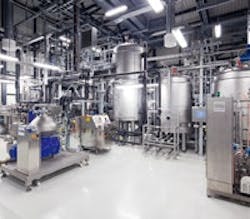Isobutene Process Progresses
Global Bioenergies, Evry, France, has awarded a contract to the Linde Group, Munich, Germany, for construction of a pilot plant at the Fraunhofer Center for Chemical-Biotechnological Processes (CBP), Leuna, Germany, to produce isobutene by fermentation of glucose. Construction of the 600-m2 pilot plant should start this fall, with operation expected about a year later. The unit will be able to manufacture about 100 mt/y of isobutene, about ten times more than the firm’s initial pilot plant at Pomacle, France. Production at this scale will enable delivery of product samples to potential customers, notes Global Bioenergies.
Figure 1. Unit in Leuna, Germany, will produce isobutene from renewable raw materials. Source: Fraunhofer Center for Chemical-Biotechnological Processes.
The company’s process produces high-purity isobutene in a single step using gaseous fermentation. This offers two significant advantages over technologies that rely on traditional fermentation to yield liquid hydrocarbons such as ethanol, says the firm: because the product is gaseous, it doesn’t accumulate in the fermentation broth and pose toxicity issues to the microorganisms; and downstream purification efforts are reduced substantially. This translates into lower costs and a better environmental footprint, claims the company.“… One aspect that really hasn’t been talked about too much but has the potential to be a significant advantage in our process is the ability to run continuous or near-continuous reactors. In classical fermenters making an alcohol, the runs are done mostly in batch or in simultaneous extraction methods that can prove costly, reduce run times, and increase capital expenditure (capex) on the facility. We have already validated at the lab pilot scale the possibility for extended run-time applications of producing a gaseous product and will continue to develop this process as we scale up our technology,” says David Gogerty, Ames, Iowa-based project manager for the company.CBP will undertake a three-year study at the facility in Leuna. The German Federal Ministry of Education and Research is supporting the project with a €5.7-million ($7.9-million) grant.The pilot plant will include two 5,000-L fermenters and a purification system using conventional technology. It will produce polymer-grade isobutene.Initially, the unit will rely on sugar from foodstuffs. However, the company hopes eventually to switch to sugar from wood wastes and agricultural residues.Earlier this year, Global Bioenergies signed a collaboration agreement with Audi, Ingolstadt, Germany. As part of the pact, Global Bioenergies will supply the automaker with isooctane derived from isobutene. The conversion will rely on conventional technology, says Gogerty. The isooctane, which has an octane number of 100, can be used at any blending ratio in gasoline, notes the firm. Global Bioenergies established enzymatic pathways to butadiene and propylene two years and three years, respectively, after developing the one for isobutene; their piloting should follow at about the same pace, believes Gogerty.
